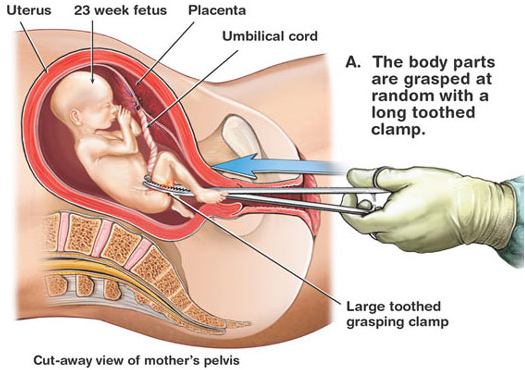The last abortion business in Kentucky fought in court Tuesday against a state law that prohibits it from aborting second-trimester unborn babies by dismemberment.
The law, signed by pro-life Gov. Matt Bevin in April, bans abortions “that will result in the bodily dismemberment, crushing or human vivisection of the unborn child” while he or she is still alive. However, the American Civil Liberties Union sued on behalf of EMW Women’s Surgical Center, the only abortion business in Kentucky, and a judge temporarily blocked the law.
On Tuesday, ACLU attorney Alexa Kolbi-Molinas told the U.S. District Court for the Western District of Kentucky that the law basically would ban all second-trimester abortions in the state, the AP reports. This, she argued, is unconstitutional.
Kolbi-Molinas claimed dismemberment abortions, or D&E, are the safest surgical abortion method in the second trimester.
Attorney for the state Steve Pitt countered that the law protects living, nearly fully-formed human beings from a “brutal, gruesome and inhumane” death, according to the report. In a dismemberment abortion, an unborn baby is pulled apart limb by limb while his or her heart is still beating, he said.
“This gruesome procedure, which rips apart a live, unborn child, is antithetical to everything that we stand for as a civilized society,” Pitt said, previously. “H.B. 454 recognizes the dignity of human life and provides an alternative method for performing dilation and evacuation (D&E) abortions that does not subject the unborn to the torture and agony of being dismembered while alive.”
The trial is expected to continue through the end of the week, according to the report.
In 2017, 526 unborn babies were aborted by dismemberment in Kentucky, The Courier Journal reports.
LifeNews depends on the support of readers like you to combat the pro-abortion media. Please donate now.
Dismemberment abortion is a procedure in which the abortionist first dilates the woman’s cervix and then uses steel instruments to dismember and extract the baby from the uterus. The procedure is usually performed between 11 and 24 weeks LMP, when the baby is somewhere between the size of a lemon and a cantaloupe.
By 11 weeks, unborn babies already have fingers and toes, heartbeats and detectable brain waves. They can respond to touch, yawn, suck their thumbs and even show signs of being right or left handed.
U.S. District Court Judge Joseph H. McKinley is the judge in the case. He was appointed by pro-abortion President Bill Clinton.
Nine states have passed dismemberment abortion bans. They include Arkansas, Alabama, Kansas, Louisiana, Mississippi, Oklahoma, Texas and West Virginia. However, many are facing court challenges by the abortion industry as well.
The Dismemberment Abortion Ban is built in part on the precedent set in Gonzales v. Carhart (2007) which upheld the federal Partial-Birth Abortion Ban, scaling back the scope of Roe v. Wade. In the court’s opinion, former Justice Anthony Kennedy, a swing vote on abortion, described what occurs in a D&E abortion: “[F]riction causes the fetus to tear apart. For example, a leg might be ripped off the fetus… No one would dispute that for many, D&E is a procedure itself laden with the power to devalue human life.”








